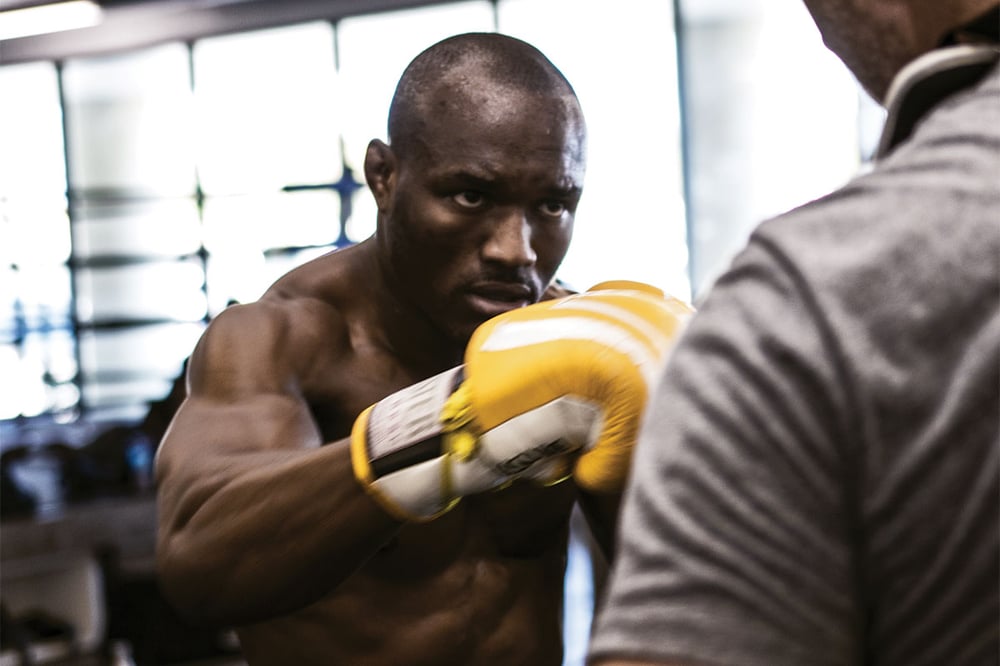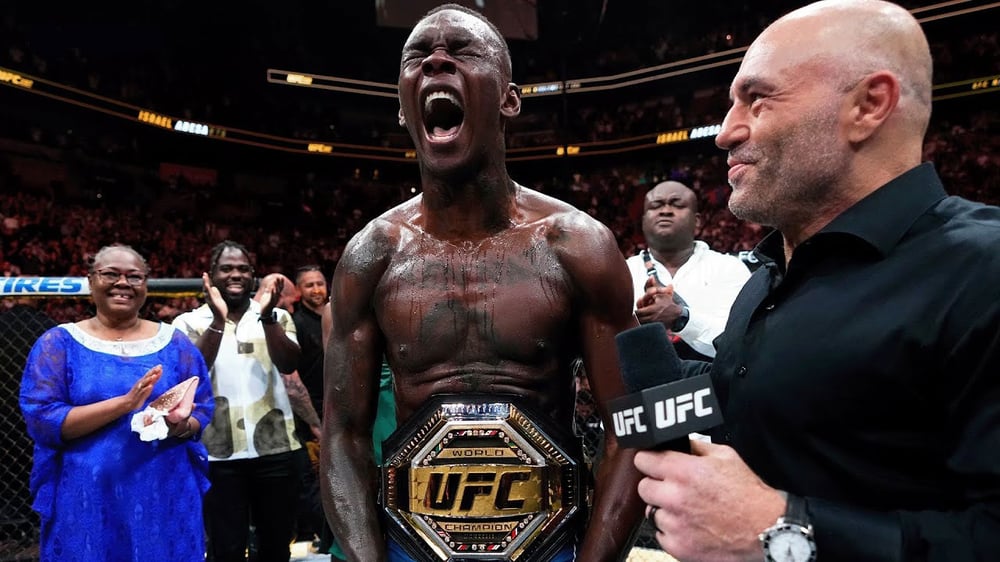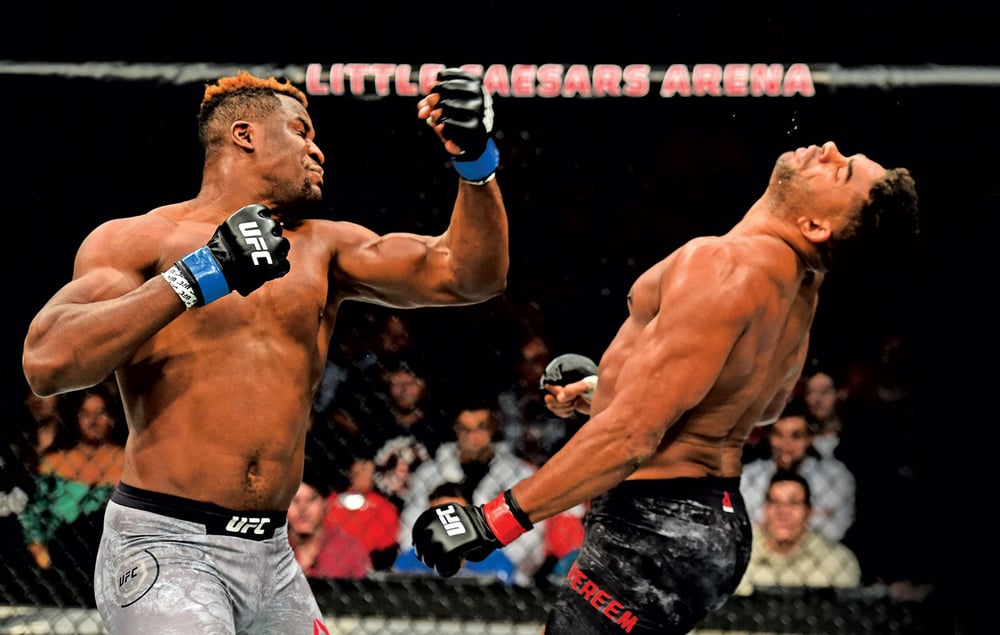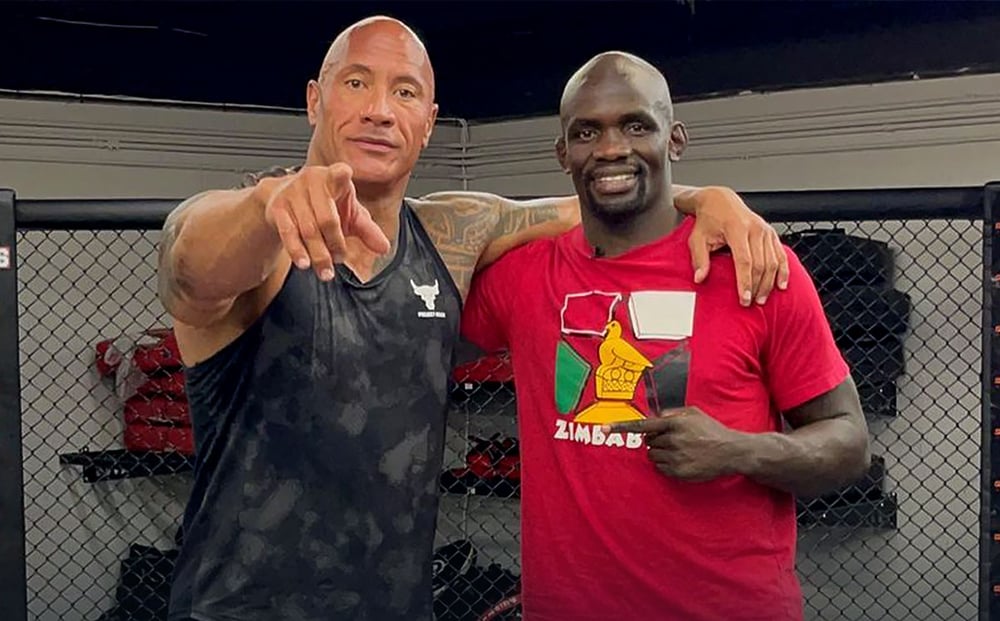
Issue 204
April 2024
Despite crowning four world champions in the past five years, the second-biggest continent on the planet is still somewhat of an untapped market when it comes to MMA. Kyle Dimond explores why Africa has produced some great talent in the sport but has had to build its MMA roots from the ground up.
It certainly has the figureheads to inspire change, and that is where the story of African MMA receives a huge power spike. Back when three of the biggest names in the sport, all holding UFC world championships, celebrated and cherished their African heritage.
THE ERA OF THE THREE KINGS
At UFC 235 in March of 2019, Kamaru Usman made history. “The Nigerian Nightmare” became the first African-born fighter to become a UFC world champion when he dominated Tyron Woodley over five rounds. Usman had announced himself in the UFC by winning the 21st season of The Ultimate Fighter and going on to rack up nine consecutive wins before getting the title shot.

Usman was born in Auchi, Nigeria, before his family followed his father to the United States when Kamarudeen (full name) was eight years old. Usman found wrestling during his time in Arlington, Texas, and went on to become an NCAA Division II national champion in 2010. All of Usman’s fights before he signed with the UFC came in the US, but that didn’t stop him from trying to give back to the African MMA scene when he bought the MMA promotion: African Knockout (AKO). Usman’s title reign ended at UFC 278 following five consecutive title defenses and recognition as one of the best welterweights ever.
The next month after Usman’s title win, the first-ever became one of two as Lagos, Nigeria-born Israel Adesanya won the interim middleweight title. Producing one of the best fights in UFC history against Kelvin Gastelum at UFC 236, Adesanya would later unify the belts against Robert Whittaker at UFC 243 in a massive battle of Australasia. Adesanya’s run to UFC gold was the opposite of Usman’s slow and steady climb as “The Last Stylebender” became a champion, having been in the promotion for just 14 months.
Adesanya’s family moved around when he was younger before settling in New Zealand when he was 10 years old. Growing up as an outsider, he gravitated towards dance to express himself and impress the people around him. This need for a creative outlet eventually manifested into kickboxing, where he would have a great career, leaving the sport behind with an overall record of 75-5. His decision to try his hand at MMA brought a lot of hype because of some of his flashy kickboxing highlights and unmistakable showmanship aura.

Adesanya is now a former two-time middleweight champion, with five title defenses in his first reign and another potential title shot right around the corner. He proudly represents Africa with a tattoo of the continent on his chest and the words “Broken Native” hanging above it.
A WORLD CHAMPION
The final piece of the African triple crown is perhaps the most remarkable of all. Francis Zavier Ngannou was born into poor conditions in Cameroon. The son of a street fighter, Ngannou chose to keep his head to the ground and work to support his family. At age 26, he decided to try and make a better life for his family by traveling to France to pursue boxing. His dream did not go according to plan at first. Ngannou spent time in jail for illegally getting into Europe and lived on the streets of Paris. Even when he did eventually come across what he was searching for, he was converted into being an MMA fighter.

Ngannou would build a 5-1 record before signing up for the UFC, having competed in France, Switzerland, and Bahrain. To shorten his incredible journey is not to do it justice, as Ngannou’s career is better served as a Hollywood motion picture. At UFC 260 in March of 2021, he became the UFC heavyweight champion in his second shot at the title. He would go on to depart the UFC and vacate the title, sign up with the PFL, and pursue a career in professional boxing. Ngannou’s story differs from Usman’s and Adesanya’s because his family didn’t have the means to leave Africa in search of a better life. Ngannou made that happen for himself and accomplished his dreams by doing whatever it took.
Part of Ngannou’s decision to sign with the PFL involved him becoming a minority equity owner and chairman of PFL Africa. With consistent events, the ability to nurture talent, and the avenues that could open for fighters, PFL Africa could be a game changer with Francis Ngannou steering the ship. PFL MENA (Middle East & North Africa) is set to host its first event on May 10 in Riyadh, Saudi Arabia.
The time of the three African kings was an incredible moment in the sport. All born in Africa and raised in different continents, they all came together to celebrate one another's accomplishments. They also campaigned heavily to bring a first-ever UFC Africa into existence. Unfortunately, this sport waits for no one, and it never did materialize. UFC President Dana White recently said at the press conference for UFC 300 that the promotion is working on plans for Africa this year, although there is no official announcement or targeted date yet.
BRINGING IN THE CAVALRY
With Usman, Adesanya, and Ngannou as their figureheads, the entire African MMA scene received a boost. As a result, you now see more African fighters in major promotions than before for multiple reasons, be it the added exposure or motivation they provide. In the UFC alone, the likes of Nigeria’s Soqid Yusuff, Suriname’s Jairzinho Rozenstruik, and Angola-born Manel Kape are all names that any MMA fan will be familiar with. You also have names like South Africa’s Cameron Saaiman, Uganda’s David Onama, Kamaru Usman’s brother, and heavyweight Mohammed Usman. Zimbabwe’s Themba Gorimbo captured the hearts of the MMA world following the incredible gesture shown to him by Dwayne “The Rock” Johnson. Gorimbo revealed that before his first UFC win, he had just $7.49 in his bank account but auctioned off his fight kit to help provide clean water for his home village. 
ONE Championship has seen wrestling powerhouses at opposite ends of the scales in Bokang Masunyane and social media sensation Oumar “Reug Reug” Kane ragdoll opponents around the cage. In the PFL, Impa Kasanganay proudly represents his family's heritage from the Democratic Republic of Congo. He produced one of the best stories of the year in 2023, where, after being on the wrong end of Joaquin Buckley’s jaw-dropping viral knockout in the UFC, he won five in a row to become the PFL light heavyweight champion.
FROM THE GROUND UP
Having frontrunners to inspire a movement is one thing, but that isn’t going far if the right foundations aren’t in place to assist them. Not everyone can have a Francis Ngannou-style story. The amateur side of the sport has continued to grow globally through the International Mixed Martial Arts Federation (IMAAF). Benjamin Bush, the President of MMA Zambia, spoke to Fighters Only about the changes that have been made and the ground that still needs to be covered.
"The work of the IMAAF in Africa has been huge. Amateur MMA needs oversight, integrity, and pathways that provide athletes with opportunities. And Amateur MMA is growing exponentially in Africa as it provides athletes opportunities to gain experience before turning pro," Bush said. "There are hotbeds of activity such as South Africa, Angola, Namibia, Egypt, etc, where athletes have access to world-class grapplers, strikers, and facilities, but there is always more that can be done... I believe through the network of federations under AMMAC (The IMMAF Africa Confederation of Countries) the growth of the sport is about to boom at a grassroots level."
Alongside the previously mentioned Kamaru Usman-owned AKO, another promotion stands out as a standard bearer for the continent. Formed in 2009, South African promotion Extreme Fighting Championship (EFC) was created in the image of the UFC. They even ran their own “The Ultimate Fighter” style reality show, in which the second season was won by UFC flyweight contender Manon Fiorot. Benjamin Bush helped set the stage for the trailblazing impact the EFC has made, which others can follow.
"The African scene outside of South Africa was always the wild west. There was no organization, no equipment standards, no officiating oversight, etc. The only place that offered anything close to quality was South Africa, who continue to lead the way with regulatory oversight, amateur youth development and professional promotions such as the EFC."
Fighters Only spoke to the promotion’s President and co-founder, Cairo Howarth, to get his viewpoint on the African MMA scene. “EFC literally pioneered the sport on the continent, getting MMA on television across Africa and exposing hundreds of millions of people to the sport for the first time,” Howarth reflects. “In the early days, we had to educate everyone - fans, media, corporates - about the sport and build up a following. As EFC, and then followed by UFC, expanded its reach across Africa on television and digital media, and the sport became more mainstream, it got a lot easier to bring in brands/companies to partner with and to get brands behind the sport. Now everyone knows what MMA is, and the sport is widely watched and followed.”
Howarth also believes that while African MMA has had a lot of catching up to do compared to the rest of the world, the cream has always risen to the top. Investment hasn’t been easy to come by, but the best talent will always find a way to make it work. “As the sport grows here, more money will come into it, and more athletes will reach the top level. Fortunately, Africa has a lot of raw talent and ability, and this is making up for any current deficit in resources in many parts of the continent.”
THE PROOF IS IN THE PUDDING
The development of MMA in Africa, grassroots, and the impact of EFC all significantly tie into the career of a current UFC champion, Dricus Du Plessis. Training out of Team CIT in Pretoria, South Africa, Du Plessis is a product of those exact grassroots, and he just so happens to be the best 185-pound fighter in the UFC right now. He was a two-weight world champion in EFC before moving on to KSW, returning to EFC for one fight and then signing up for the UFC, where he was undefeated in seven fights.
The impact of Kamaru Usman, Israel Adesanya, and Francis Ngannou is that they are three of the sport’s biggest names, all championing their African heritage. Du Plessis differs from all of them because he learned his craft in South Africa. Throughout his UFC run, he has made it very clear that showing that people in South Africa can compete with anyone in the world is a major motivator for him. Du Plessis is living proof that the African MMA scene may be playing catch-up to some degree, but that isn’t a criticism of their athletes.
Four UFC champions in five years is a remarkable achievement for the continent. What could take the sport to new levels of prominence in the region is an all-African title fight. Hosting major MMA events in Africa is a big step that needs to happen. Still, in terms of getting people talking and dialing up the enthusiasm for the sport in Africa across the board, Dricus Du Plessis versus Israel Adesanya for the middleweight title could be the fight that seals the deal. UFC 305 in Perth on August 17 appears to be the date that both men are working towards. The fight won’t just be the biggest in the history of African MMA; it’s a grudge match that has the world talking. Regardless of all the talk that will grab the headlines, this is about two elite fighters born on African soil competing for the most coveted prize in the sport, the UFC world championship. If there was any time to back MMA in Africa, it’s right now.










